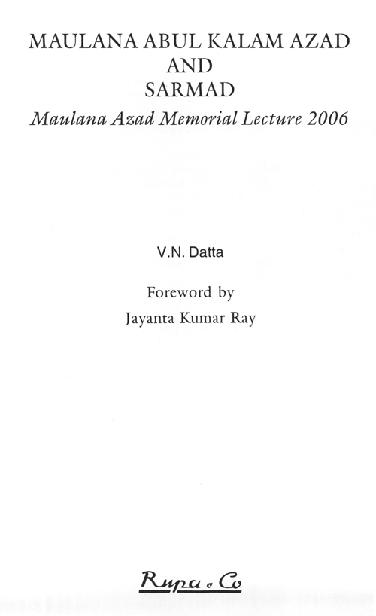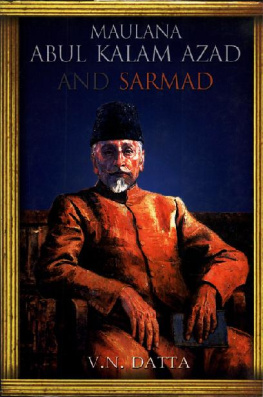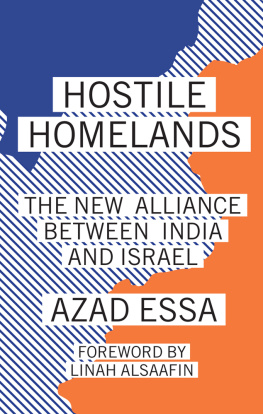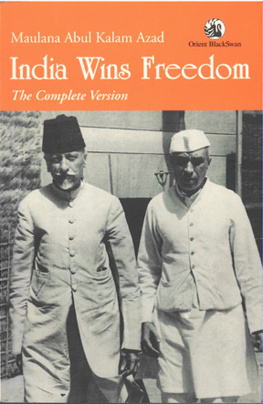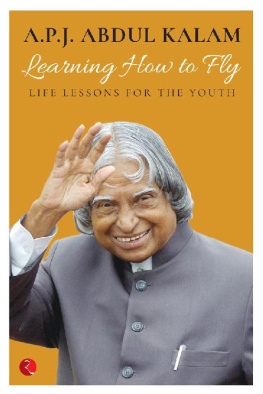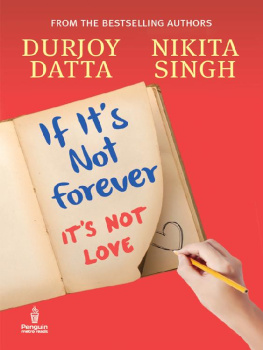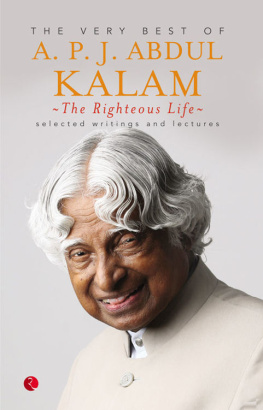MAULANA ABUL KALAM AZAD
AND
SARMAD
Maulana Azad Memorial Lecture 2006
Copyright V.N. Datta 2007
Published 2007 by
7/16, Ansari Road, Daryaganj,
New Delhi 110 002
Sales Centres:
Allahabad Bangalore Chandigarh Chennai
Hyderabad Jaipur Kathmandu
Kolkata Mumbai Pune
All rights reserved.
No part of this publication may be reproduced,
stored in a retrieval system, or transmitted, in any form or by
any means, electronic, mechanical, photocopying, recording or
otherwise, without the prior permission of the copyright publishers.
Printed in India by
Saurabh Printer Pvt Ltd.
A-15-16, Sector-IV
Noida 201 301
No one can properly be said to write history but
he who understands the human heart.
Oliver Goldsmith
CONTENTS
FOREWORD
n the annals of Indian history, Maulana Abul Kalam Azad is among the more highly rated political figures associated with the freedom movement. Valued for his unwavering advocacy of territorial/secular nationalism, Maulana Azad was one of the foremost political thinkers who proved crucial to the making of the idea of India. It is interesting, however, that the broader intellectual persona of Maulana Azad has rarely been given a systematic treatment from the standpoint of intellectual history. Prof. V.N. Datta's treatment of Azad's essay on Sarmad, originally delivered as Maulana Azad Memorial Lecture in 2006, is a refreshing attempt in this direction.
The first section of the manuscript deals with Azad's writing on Sarmad, and the second cites from Sarmad's Rubaiyat. The paper is based on the author's understanding of Azad's essay on Sarmad and its significance in the evolution of Azad's religious and political life. The author notes that Azad was about twenty-two years old when he wrote his essay on 'Sarmad' at the instance of Khwaja Hasan Nizami (1878-1957), a distinguished Urdu writer, for the special shahid issue on martyrs, for his Urdu journal Nizam ul Mushaikh, in 1910. It is generally argued that the significance of the essay lay in the fact that Azad's abiding faith in the unity of religions, his idea of love of humanity, his advocacy of a composite culture and his fight for the freedom of his country all originated from what he had expounded in his essay on Sarmad. However, the author thinks otherwise. The author's intention is to examine why Azad wrote the paper, what prompted him to do so, what were his feelings and thoughts and why he chose Sarmad as the subject of his essay. The author argues that Azad chose Sarmad since he saw in the martyr's life a mirror of his own life and experiences.
In his essay, Prof. Datta adopts an interesting approach (originally adopted by the likes of C.B. Macpherson)he uses Azad's depiction of the life of Sarmad to provide the reader with an insight into the persona of Azad himself. This exercise is interesting in itself not because it gives any really new information into the life of Sarmad, but because it reveals some new things about Maulana Azad the personthus we come to learn a lot about the author, through the agency of the text and via the prism of the protagonist.
Sarmad was a poet and scholar of Armenian Jewish extraction, who came to India from Safavid Persia in the seventeenth century, and fell in love with a Hindu boy. A convert to Islam, Sarmad studied Islamic philosophy under the guidance of the renowned seventeenth century Iranian Platonist thinker, Mulla Sadra, and had imbibed from him a fascination with batini Islamwhich emphasises the essence over the form. His sensual infatuation with the Hindu lad helped him realise the essential purity of transcendental love of God that the Platonists like Mulla Sadra used to champion. The lyrical poetry and batini philosophy of Sarmad then went on to win for him the friendship of Prince Dara Shukoh, which then in turn proved his undoing by drawing the ire of AurungzebAlamgir had Sarmad executed for heresy.
In choosing Sarmad as a protagonist, Azad proved himself to b extremely liberal if not bold. Homosexual attachment is considered un-Islamic in almost all schools of Islamic thought. While homo-sexuality has been the subject of poetry, it never gained acceptance, let alone respectability in the learned circles. Azad, however, despite being a Maulana, refused to bow to conventional taboo and chose to treat Sarmad's infatuation not as a manifestation of reprehensible carnal desire, but as one of pure love. Sarmad's infatuation appeared to him as a ceaseless desire to have one's own persona extinguished in the act of being in lovenot unlike the manner in which Sufi thinkers would suggest the value of being dissolved (fanaa) in the Divine. So doing, Maulana Azad clearly stated his own preference for the ' self-luminous understanding' of Dara Shukoh over the 'icy reasoning' of the legalist Aurungzeb. This, it needs be appreciated, flew in the face of the more articulate tradition among the 'ulema' of the Indian subcontinentthough not necessarily the more predominant tradition. Prof. Datta also adds, almost parenthetically, that Azad's own sympathy with the personal plight of Sarmad as an unfulfilled lover was probably motivated by Azad's failure to win the love of a particular lady.
Prof. Datta's erudition, coupled with his liberal yet measured use of Persian quatrains ( ruba'iyyat) and Urdu nazm, makes this treatment almost as valuable as a piece of literature as it is as a work of intellectual history.
Azad's humanistic ideals are highlighted in this essay: He inspired Indian nationalists of his generation to have faith in these ideals that were practised by individuals even as they suffered authoritarian excesses of Mughal rule centuries ago. Azad's convictions about universal brotherhood are established by his frequent reference, to past examples and past tradition. Universal brotherhood was a precept of the Sufi tradition represented by Sarmad, the chief protagonist of Azad's essay. Datta takes us through the pages of history, to the unfamiliar domain of Mughal history, to the world of the ethereal and the sublime represented by humanists like Sarmad and philosophers like Dara Shikoh. Poets and composers of the post-Sarmad generation praised pirs like Sarmad who suffered martyrdom during the Mughal era. It is this subject of the intellectualism of educators and philosophersa subject that was seldom dealt with by court historians of the Mughal erathat Azad, and now Datta, draw our attention to. Both are critical of this lacuna in Indian historiography. In a sense, Datta, like Azad, feels that it is essential to reconstruct Mughal history by not highlighting dynastic histories and court intrigues, but local sensibilities of merchants, itinerants, scholar-travellers, faquirs from north-western India, who spread the message of love irrespective of religion, caste or creed. This aspect of humanism was in stark contrast to what Emperor Aurangzeb and his court represented: unabashed authoritarianism and religious orthodoxy.
So, Azad claims that the story of Sarmad cannot be detached from the overall political disposition in Mughal India. Throughout his treatise, through similies, metaphors, allegories and analogies, Azad makes a clear distinction between the good and the bad. Sarmad's spiritual quest, Dara Shikoh's scholarly pursuits and noble qualities are indicative of an intellectual tradition, thoroughly misrepresented and underrated in Mughal historiography. Sarmad and Dara Shikoh were unlucky figures who were caught unaware in the whirlwind of political intrigue. Sarmad did not defy the authorities but upheld an alternative visionthat of spirituality and humanism. It is this alternative vision that Azad also represented. In Datta's treatment of Azad and in his reconstruction of Azad's autobiography, the Tazkira, we get an impression of the transcendental awareness of Azadof India's pluralistic culture and humanistic tradition, represented by personalities like Sarmad. Datta indicates that martyrdom, which Dara Shikoh and his contemporaries like Sarmad are associated with, is a pointer to the disintegrative aspect of Mughal rule. Perhaps, it is more useful to deal with the intellectualism that Sarmad or Dara Shikoh represented. This new understanding of a bygone era could stimulate discussions about India's multicultural past. Azad's take on Sarmad and Datta's take on Azad are both reflective of the reassessments about Mughal historiography.

